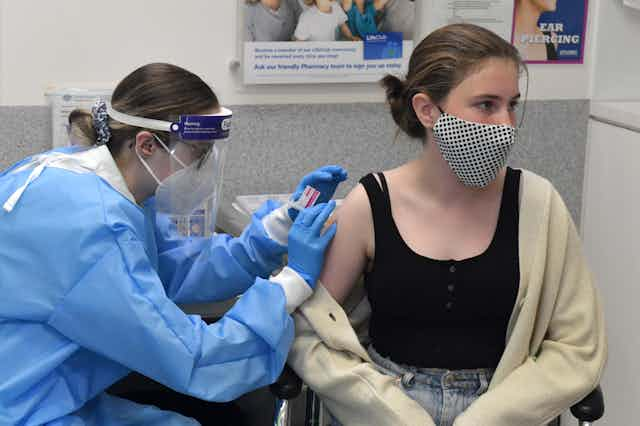

Margie Danchin receives funding from the NHMRC, WHO, DFAT and the Commonwealth and State Departments of Health. She is Chair, Collaboration on Social Science and Immunisation (COSSI).
Voir les partenaires de The Conversation France
As Australia works towards getting 80% of over-16s fully vaccinated against COVID and higher, there’s more pressure to mandate vaccination across a range of sectors.
Some sectors in certain states and territories already have a COVID vaccine mandate in place, such as health and aged-care staff. Victoria last week mandated COVID vaccination for all authorised workers in the state, which has been a tough but necessary decision. Governments and businesses are also considering mandates for many other groups.
Vaccine passports are also on the way, meaning you’ll need to show proof of being fully vaccinated to do things like travel internationally, and to visit venues in hospitality, entertainment, retail and others in certain states and territories.
But there are some people who can’t get a COVID vaccine for medical reasons, though these are very rare. So what are these conditions, and if you have one of them, how can you prove it?
It’s recommended all Australians over 12 receive two doses of a COVID vaccine. We have robust data now on these vaccines, so we know they’re safe and effective. Serious adverse events are very rare.
There are few situations where someone can’t have a COVID vaccine for medical reasons. The criteria to receive a permanent medical exemption are very narrow and rarely required.
The only criteria are:
For live vaccines, such the measles, mumps, and rubella (MMR) and varicella vaccines, people who are significantly immunocompromised can get a permanent medical exemption. But this isn’t relevant for COVID vaccines because they’re not live vaccines.
There are some conditions people commonly believe may require a vaccine exemption, but the following are not reasons to be exempt from COVID vaccination:
There are some situations when a COVID vaccine may need to be temporarily deferred. For example, if someone has an acute illness with a fever of 38.5°C or over. However, this would usually be for a short period only and wouldn’t require them to obtain a written temporary medical exemption.
But there are also some “acute major medical illnesses” where people may be able to get a temporary immunisation medical exemption form. This needs to assessed and given by a medical provider, and only temporarily exempts you from a COVID vaccine.
Last week ATAGI, the Australian Technical Advisory Group on Immunisation, which provides medical advice to the federal government on the use of vaccines including COVID vaccines, released expanded guidance on which of these conditions may warrant a temporary medical exemption.
These exemptions include people with acute major medical conditions such as major surgery or hospital admission for a serious illness.
Temporary exemptions are only recommended to be provided for up to six months. Ideally, they’re reviewed within six months to see whether the person has recovered and can now be safely vaccinated. They’re also only given if another COVID vaccine isn’t suitable or available.
Temporary exemptions may also be specific to a certain vaccine, such as:
If possible and safe, individuals who can’t get one of the above vaccines for one of these reasons should receive an alternative COVID vaccine.
Temporary exemptions may also be for people who:
Pregnancy isn’t a valid reason for exemption, in the absence of any of the criteria listed above.
COVID vaccine medical exemptions can be obtained from general practitioners, paediatricians, clinical immunologists, infectious disease, general or public health physicians, gynaecologists or obstetricians.
If someone thinks they qualify for an exemption based on the above, it’s often best to visit a GP first to discuss.
The federal government will introduce a certificate system for people to prove they have a medical exemption later this month. These would be available through the Services Australia app.
With mandates looming, GPs and other providers will feel pressure to dispense exemptions to people not wanting to be vaccinated. Employers will be seeking clarity about who can receive one. This can often cause distress and conflict if the request for an exemption is denied, for both the provider and patient.
Also, if mandates aren’t applied equally and fairly, there’s a risk of compounding disadvantage.
These mandates are made at a jurisdictional level, so there may also be differences regarding which groups are affected depending on the state or territory.
The stakes are high for those who remain unvaccinated, so it’s vital employers, individuals and medical providers are aware of the new ATAGI clinical guidance regarding the medical exemption criteria and that jurisdictions provide additional clarity about the process.